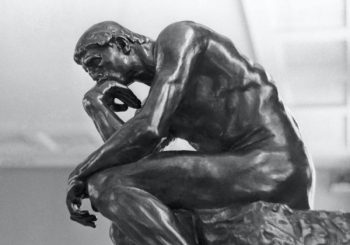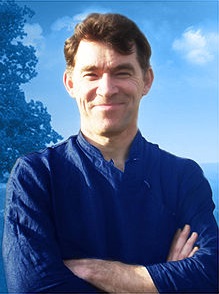Guest writer for Wake Up World
One of the most well-known phrases in philosophy is, “I think, therefore I am,” from the 17th-century French philosopher René Descartes. The statement is usually taken to mean that the act of thinking generates our sense of identity, and that without thought we would cease to exist. But strictly speaking, Descartes was arguing that the only thing in the world we can be sure of is that we exist, because we have the ability to think. We can doubt everything else—even that the sun will rise tomorrow morning—but so long as we are thinking, we can’t doubt our existence.
[pro_ad_display_adzone id=”110028″]
It seems impertinent to disagree with such a revered old philosopher, but in my view, Descartes was wrong to put so much emphasis on thought. More broadly, this is true of our culture, too. Western cultures tend to extol the act of thinking, valuing thought over instinct and logic over intuition. We associate thought with civilisation, and its absence with barbarism and savagery. But I believe that, in many ways, it would be better if we thought much less.
We don’t cease to exist when we stop thinking. In fact, we exist in a more authentic sense. Incessant thinking creates a superficial and even illusory sense of identity. Thought obscures our essential nature, and the well-being and spontaneous creativity which arise from it. To be conscious without thought is an ideal state, one we should aspire to.
Two Types of Thinking
It’s important to note that there are, broadly speaking, two different types of thinking. On the one hand, there is rational, conscious thought, when we think deliberately and logically to make decisions and plans, organise our lives, and solve problems. These are the powers of reason that we use in philosophy and mathematics. This type of thinking is a great tool, and we are right to value it highly.
However, conscious logical thinking is actually quite rare. The vast majority of our thinking belongs to a different category—random associational chatter which runs through our minds involuntarily. It usually includes thoughts about the future and the past, daydreams about our desires and ambitions and alternate reality, or snippets of conversations and songs. When our attention isn’t occupied by external tasks or entertainment—or when we can’t fix our attention steadily to a task and become bored—our minds are usually overrun with these associations.
Associational thinking can sometimes be pleasurable—daydreams and pleasant memories, for example. However, in general, “thought chatter” has a very negative effect. It creates a sense of disturbance inside us, as if our minds are out of control. It also reinforces our sense of separateness, rooting us inside our mental space, in duality to a world which seems to be out there, on the other side. Thought chatter also gravitates towards negativity. It’s easy to become trapped in negative thought patterns, which can give rise to self-dislike and depression.
The Happiness of Not Thinking
Most of the greatest experiences of our lives occur in the absence of thinking. For example, one of our most pleasurable experiences is the state of “flow,” when our attention is absorbed in challenging and stimulating activities, such as playing music, dancing, writing, or reading. Ideally, we might have a stimulating job that provides us with regular experiences of flow. One of the reasons why flow equates to well-being is that we stop thinking. As our attention merges with an activity, our minds become quiet and empty. We may even completely lose self-awareness.
Similarly, one of our most positive experiences is the feeling of awe, when we’re struck by powerful works of art or spectacular landscapes. An intense and beautiful piece of music or art—or a beautiful building or natural scene—stops our minds. Even if just for a few moments, our thoughts are stunned into silence.
A final example is meditation. The whole aim of meditation (at least in many variants) is to stop thinking. We focus our attention on our breathing or a mantra or a candle flame, and gradually our minds become calmer and quieter. If we do manage to quieten our thoughts—or even just slow them down—we experience a powerful sense of well-being.
In a state of deep meditation, we may experience the state of being conscious without thinking at all. This is one of the most powerful and positive states we can experience. There is a sense of deep peace and wholeness. It is this state which contradicts Descartes’ dictum most of all. Rather than ceasing to exist, we have a much purer and deeper sense of identity.
Thought as a Tool
I certainly don’t believe we should stop thinking altogether. As highlighted above, conscious thought is necessary and useful. The most ideal human state would be for us to think whenever we need or want to. Thought should be a tool that we pick up when we need it, and then put down again. Then we can return to the harmony of a state of mental quietness.
This may seem like an unrealistic ideal, but in my research, I have met many people who report that their minds are much quieter than they used to be, and who regularly experience periods of no thought. This is one of the effects of the phenomenon I have termed “transformation through turmoil,” a shift into a higher functioning state that sometimes occurs in the midst of intense psychological suffering.
Following this transformation, people also report that they feel more present and sensitive to beauty. They report a greater sense of well-being and a feeling of living more authentically, with a greater sense of purpose—perhaps because they have become free of their thinking mind and the superficial identity it creates.
Originally published at Psychology Today and reproduced with permission.
Recommended articles by Steve Taylor, Ph.D:
- The Possibility of Precognition
- Hypnotic Healing: What is Responsible for the Placebo Effect and Hypnosis?
- Beyond Religion: Will Human Beings Ever Transcend the Need for Religions?
- The Transformational Effects of Bereavement
- Post-Traumatic Creativity: How Psychological Turmoil Can Unlock Our Creative Potential
- The Meaning of Life May Be Life Itself
- Spiritual Depression
- Do Psi Phenomena Exist? A Debate (Part One)
- Do Psi Phenomena Exist? The Debate Continues
- David Ditchfield’s Remarkable Near Death Experience
About the author:
Steve Taylor is a senior lecturer in Psychology at Leeds Beckett University, UK. His latest books in the US are The Calm Center and Back to Sanity: Healing the Madness of the Human Mind. He is also the author of The Fall, Waking From Sleep, and Out Of The Darkness. His books have been published in 19 languages. His research has appeared in The Journal of Transpersonal Psychology, The Journal of Consciousness Studies, The Transpersonal Psychology Review, The International Journal of Transpersonal Studies, as well as the popular media in the UK, including on BBC World TV, The Guardian, and The Independent.
Connect with Steve at StevenMTaylor.com.
[pro_ad_display_adzone id=”110027″]








